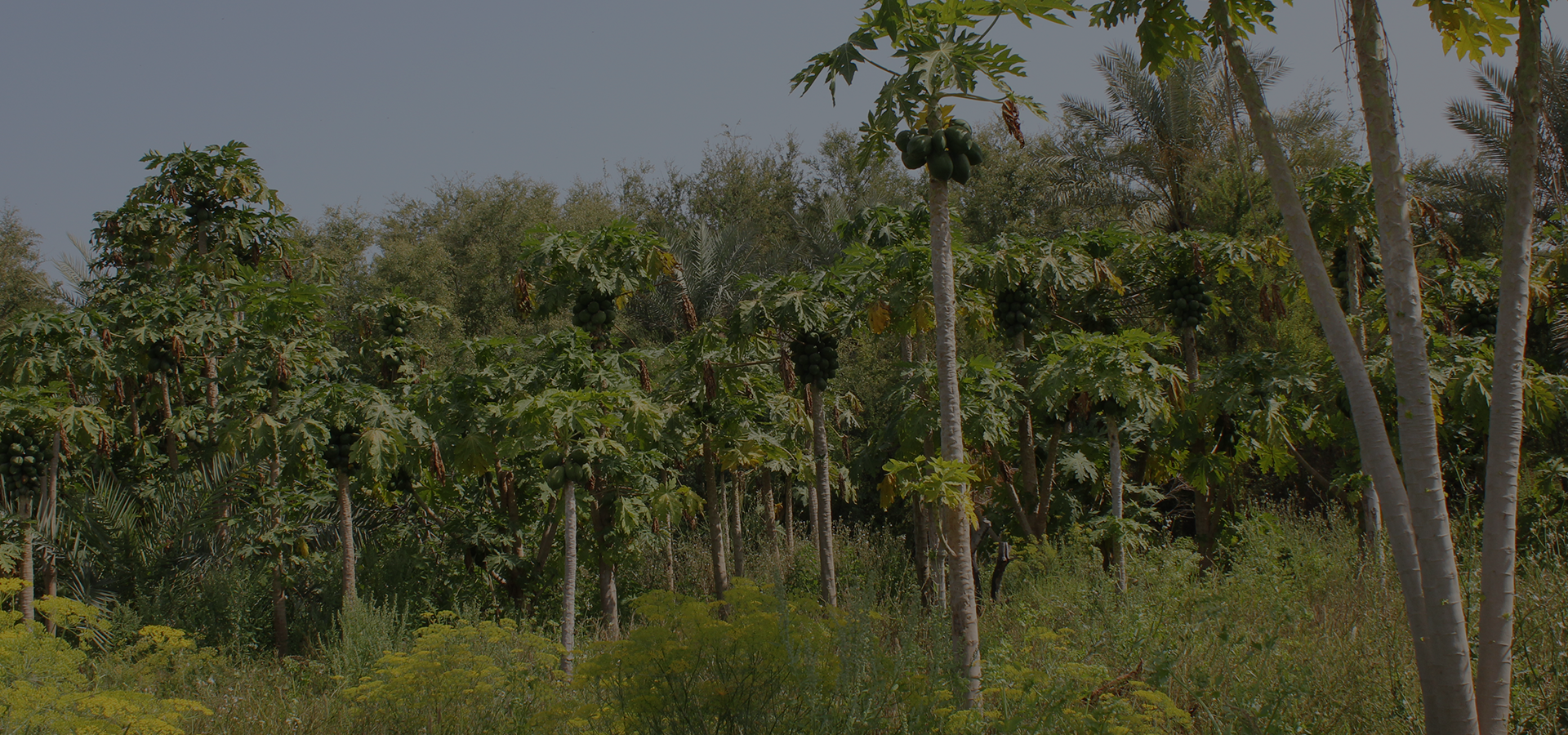Food Security Scene in Bahrain
Food security worldwide is a challenge especially in light of climate change impacts. Considering Bahrain’s multiple challenges including sea level rise, scarcity of natural freshwater supply and increasing demand, desertification, rising temperatures which impact agricultural lands. Hence, the Kingdom has put in a lot of effort to ensure that its people and their access to food supplies is not compromised. This is evident in the fact that the majority of the country’s population (99%) have safe access to drinking water with no record of people living on or below the global poverty line (Information & E-Government Authority, 2020).
In 2021, Bahrain was declared as a food secure nation ranking 43rd worldwide by the Global Food Security Index. The assessment ranks countries based on food (1) affordability, (2) availability, (3) quality and safety and (4) natural resources and resilience and is conducted by the Economist Intelligence Unit. Globally, out of 113 nations, Bahrain has scored as follows:
(1) Affordability = 46th , (2) Availability = 21st , (3) Quality and safety = 41st and (4) natural resources and resilience = 107th.
Despite being ranked amongst the top 50 food secure countries in the world, Bahrain imports 90% of its food (Gulf Daily News, 2021). The Bahraini government is working towards developing a comprehensive national food security strategy which includes forming a higher national authority dedicated towards food security through centralising and unifying all jurisdictions that fall under this mandate as currently, various jurisdictions fall under different governmental entities and parties. In 2019, Bahrain has signed four agreements with the United Nations Food & Agriculture Organisation (UN FAO) in order to (1) develop a food resource diversification strategy; (2) improve IT systems, databases, and agricultural statistics in the Kingdom; (3) support the sustainable development of the aquaculture sector and; (4) controlling and eradicating animal diseases that may affect human beings and improving animal breeding (Information & E-Government Authority, 2020).
Plans include promoting and supporting local products whilst imposing restrictions on excessive imports; encouraging the private sector to finance food security projects in addition to security agricultural land/ plots in other countries for Bahrainis to invest in agriculture (Information & E-Government Authority, 2020).
Similar to many countries worldwide, agriculture and fisheries are key contributors towards food security. Despite the fact that only 2.86% of Bahrain Island is classified as agricultural lands (Urban Planning & Development Authority, 2022), Bahrain has invested in the last couple of years in the development of both sectors. This is evident in the multiple national initiatives launched to support local farmers and investors in this sector in addition to laying the basic platform to allow locals to expand into rising fields within the sector such as hydroponics, bee farming and aquaculture. The official government entity responsible for food safety in Bahrain is the Directorate of Agriculture and Marine Resources which is under the Ministry of Works, Municipalities Affairs and Urban Planning.
National initiatives that support the development of the agricultural sector in Bahrain include the following:
Provision of subsidies, loans and exemption from tariffs and taxes on agricultural practices and livestock. For example, the Bahrain Development Bank offers agricultural loans upto BD 15,000 with 0% interest rate to be used for development of agriculture production in Bahrain (Bahrain Development Bank, 2022). In addition, local farmers and enterprises are able to benefit from the Growth Assistance Scheme (GAS) which is offered by Tamkeen under its Enterprise Development Support Programme. Further support is given by the The National Initiative for Agricultural Development (NIAD) through their projects which include the King Hamad Prize for Agriculture and the Agricultural Incubators Center.
In 2012, the Farmer’s Market was launched as an initiative to support sustainable food production and promote the sustainable sale of products locally produced thereby developing the country’s agricultural sector. This was run by the Directorate of Agriculture and Marine Resources in collaboration with the National Initiative for Agricultural Development (NIAD). For the last decade, both entities have worked over the years to boost the local farmers and products they offer via bridging the gap between the members of the public (consumers) and the farmers through holding the seasonal (usually from December to April) Farmer’s Market which takes place at the Budaiya Botanical Gardens on an annual basis. Due to the success of the market over the last few years, and to ensure that farmers can benefit throughout the years, a permanent basis was built and supplied to the farmers at Hoorat A’ali to sell their products throughout the year.
In addition, the Ras Hayan Mariculture Centre which is the national aquaculture center, has been working hard at enhancing its capacity and developing its hatchery area whereby it is currently producing Sobaity seabream (Sparidentex hasta), fingerlings and brown-spotted grouper (Epinephelus coioides). The Directorate of Agriculture and Marine Resources has set up a partnership with Taiwan Authority for International Cooperation to produce new species such as Mead and Barely. The partnership includes training Bahraini citizens to familiarise and use various aquaculture techniques in addition to supporting local enterprises to establish aquaculture practices (The Daily Tribune, 2021). Other national initiatives to develop the aquaculture sector include inviting the private sector to invest in aquaculture, launching training programs under Tamkeen to train citizens in fish farming, allocating sites / locations for fish farming.
Information Sources and References
1 – Information & E-Government Authority (2020) Food Safety and Security. Last accessed on 28 April 2022. Available Online via <https://www.bahrain.bh/new/en/foodsafety_en.html>
2 – Information & E-Government Authority (2020) Agriculture Affairs and FAO Sign 4 Food Security Partnership Agreements. Last accessed on 28 April 2022. Available Online via <https://www.sdgs.gov.bh/NewsDetails?nid=QYkMQebfmyiuuxx/Dx8oFQ==>
3 – Information & E-Government Authority (2020) Farmers Market. Last accessed on 28 April 2022. Available Online via <https://www.bahrain.bh/new/en/foodsafety-farmersmarket_en.html>
4 – Global Food Security Index (2021) Ranking and Trends. Last accessed on 28 April 2022. Available Online via <https://impact.economist.com/sustainability/project/food-security-index/Index>
5 – Bahrain Development Bank (BDB), (2022), Agricultural Loans. Accessed on 28 April 2022, Available Online via <https://bdb-bh.com/financial-services/agricultural-loans/ >
6 – Gulf Daily News (2021) Blueprint for food security projects in Bahrain. Last accessed on 28 April 2022. Available Online via <https://www.zawya.com/en/economy/blueprint-for-food-security-projects-in-bahrain-pknuebkm>
7 – Urban Planning & Development Authority (2022) Land Use Statistics. Last accessed on 28 April 2022. Available Online via <https://upda.gov.bh/en/category/land-use-statistics>
8 – The Daily Tribune (2021) Ras Hayyan Aquaculture Centre Production up by 70%: Bahrain Minister. Last accessed on 28 April 2022. Available Online via <https://www.newsofbahrain.com/bahrain/71510.html>
9 – The Daily Tribune (2020) Need for Advanced Training in Aquaculture Stressed. Last accessed on 28 April 2022. Available Online via <https://www.newsofbahrain.com/bahrain/60190.html>
10 – Gulf Daily News (2019) Investment Plan to Boost Fish Farming in Bahrain. Last accessed on 28 April 2022. Available Online via <https://www.zawya.com/en/business/investment-plan-to-boost-fish-farming-in-bahrain-uiatgg5n>



